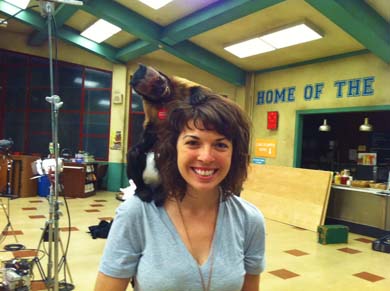The first check Megan Ganz, BA ’06, ever cashed for writing comedy came from MAD magazine. It was for the book’s signature fold-in feature, one of MAD’s enduring trademarks. The Mary Kay Letourneau scandal—in which a school teacher went to prison for sleeping with a minor—inspired the politically incorrect gag. And as with all great comedy, monkeys played a part.
Checks from the satire news organization The Onion came next. And at just 28, Ganz now counts two network television series on her writing resume, “Community” and “Modern Family.” Comedy, says the writer, has been a way of life for as long as she can remember.

(Image courtesy of Brillstein Entertainment Partners.)
“I got into comedy before I knew that I wanted to write,” Ganz says from her current home base in Southern California. “I loved comedy. I was always really shy, so when I gave performance a go in high school, I realized I didn’t have the performing bug. I didn’t like being on stage or in front of crowds, but I loved comedy and being behind the scenes.”
As an English lit major at Michigan, Ganz split her time at U-M between serious coursework and contemporary humor. She was editor-in-chief of the campus publication The Every Three Weekly (aka the E3W), one of her happiest student experiences. E3W took its cue from The Onion and served as the ideal outlet for her developing voice, trained on a consistent regimen of “Saturday Night Live” and “Late Night with David Letterman.” Ganz also counts such creative influences as actor/comedian/activist Bill Cosby, humorist Dave Barry, and children’s author Louis Sachar. Peanuts creator Charles Schulz and Calvin and Hobbes cartoonist Bill Watterson also shaped her eclectic vision.
In the following Q&A, Ganz shares some insights about the serious business of being funny.
During college, you interned for MAD magazine and sold a fold-in idea. I can’t imagine that happens every day.
They told me I was the first intern to come up with a fold-in. They bought it from me and that was the first check I ever got making comedy. Then MAD cartoonist Al Jaffee illustrated it and sent me a letter. The fact that that was the first thing I ever sold in comedy was really special to me.
You always wanted to write for The Onion. How did you achieve that dream?
My mom bought me my first Onion book when I was 13, so I always wanted to write for them. I received one of two writing fellowships to The Onion. It was an internship where you learned how to write Onion stories. My internship lasted three months, and I was doing so well that they were publishing my stories. After I was done, they asked me to freelance and I was doing a story a week. After three months of being a freelancer, they hired me full time. I thought it was so funny that it was my first job out of college, which is really amazing. I worked there for three years and I was the associate editor by the time I left.
And why did you decide to leave?
While I liked it, The Onion is such a singular entity that there’s nowhere to go except to run the paper itself, but I wasn’t interested in advancing. When I left, I said to my roommate, “I’m gonna quit my dream job today.” That was really scary.
In the course of working for The Onion, I had agents calling to represent me, encouraging me to go into TV writing. I thought I’d move onto “The Daily Show” because that seems to be in the same wheelhouse, but the first thing I was offered was Comedy Central’s (sketch-variety show) “Important Things with Demetri Martin.”
Had you ever considered writing for TV?
I never thought about doing TV before but had a real affection for it. TV is sort of like waitressing though—you can’t get a job unless you’ve done it already. So I thought, “I better take it. How often do people get offered these jobs?” I thought, “I’ll take this, try it, and see if it works.” I was freelancing for The Onion from L.A. and in the worst-case scenario, I could go back and work for The Onion.
However, you learned you had a flair for TV writing.
I really liked it, but I didn’t like sketch-writing that much. After I was done with “Demetri Martin,” I thought, “Before I go back to The Onion, let me try to get a job on a sitcom.” I told my agent “Community” was my favorite show. That was my first interview I got. They hired me, and here I am (laughs).
Talk about working with “Community” creator Dan Harmon (whose credits include work with actors Owen Wilson, Jack Black, Sarah Silverman, and Drew Carey).
He’s very brilliant, very challenging, so it really forces you to step up your game in order to meet him. Just to even have a conversation with him, you have to be at the height of your intelligence all the time. I loved working with him. It was a difficult job because the hours were very long. You could never settle for good enough; he’d always raise the bar in every episode to try and do something weirder and unexpected.
In a lot of ways, he was very supportive of me. He hired me even though I’d never worked on a sitcom before. He put a lot of faith in me to do things like writing an episode right away. He let me be on set to make sure the episode was filmed correctly, which is something you don’t always get to do on shows. He was very creatively supportive of the writers.
The show is about a quirky group of community college students (including original “Saturday Night Live” cast member Chevy Chase, who exited in 2012). Do you have a favorite character?
Over the years, I really came to love Britta (Gillian Jacobs) because she’s a lot like me as I was growing up. She’s very stubborn and earnest but she falls on her face a lot. She’s very confident, sometimes too much. She’s also got a lot of feminist ideals. I had a lot of those growing up when I would do things to show people how much of a feminist I was—which were ridiculous and not necessary. I came to really love Britta. She was my favorite to write at the end.
“Community” premiered in September 2009, and when it disappeared from NBC’s 2011-12 lineup fans responded with passionate campaigns on social media. The show was back on the air in March 2012. How do you explain its staying power?
People can get ferocious for shows on the bubble. “Community” has been shifted around a lot. I think people feel real ownership of the show and believe it matters because it has a small, diehard audience. If you take a show like “Two-and-a-Half Men,” fans don’t feel they have ownership because 6 million people watch it every week.
“Community” has a small but loyal fan-base that knows each other and talks to each other online. They’re going out to promote it to their friends. A lot of the reason we’ve gotten more seasons is because fans have been so vocal about following the show. The numbers weren’t always there, but there’s a dedicated fan-base that shows up every week to watch—that’s the only reason why we made it so far.
You recently left “Community” to write for the Emmy-winning “Modern Family,” which also premiered in September 2009. What prompted that move?
It was more for practical reasons than any problems I had creatively. My “Community” contract was for three years and it was up at the end of this year, so I had the option of not renewing. “Community” was the only show I’d ever written for, and I wanted to expand my palette by writing different characters. I wanted to see how different writers’ rooms operate.
What characters are you looking forward to writing the most?
I’m excited for the whole ensemble. It’s nice to have a whole new group of characters to write for: Haley (Sarah Hyland), Alex (Ariel Winter)—who’s a middle child like me—and Luke (Nolan Gould). Their family’s like mine in some ways. I hope I have experiences to bring for those kids to engage in.



